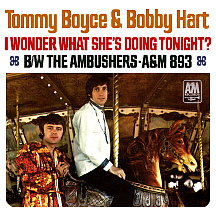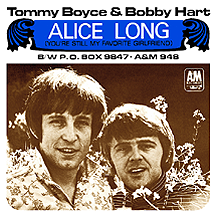TOMMY BOYCE AND
BOBBY HART
I Wonder What She's Doing Tonight?
To most music fans, the names Tommy Boyce and Bobby Hart are inseparable. Their partnership was notable on at least two levels: as the primary songwriting and producing team for The Monkees, that phenomenal quartet of hitmaking network TV stars who took the nation by storm from 1966 to '68, and for their "side project" as singing-songwriting wonder boys with a few hit singles of their own during the same period. But as busy as they were during that time, there were several years prior and an even longer stretch afterwards when, separately and together, they experienced other professional high points.
Robert Luke Harshman's beginning came in February 1939 in Phoenix, Arizona. Sidney Thomas Boyce entered the world in Charlottesville, Virginia in November. Two decades later they were both in Los Angeles seeking separate careers. Harshman waxed four sides for the Radio and Guyden labels in '59 using his full name; the first, "Love Whatcha' Doin' to Me," is a standout Southwestern-style rocker. Boyce, meanwhile, worked with John Marascalco (who'd written several of Little Richard's hits for the L.A.-based Specialty Records). The two came up with "Be My Guest" and achieved the unthinkable: New Orleans rocker Fats Domino recorded the song and took it to the top ten late in the year. "Betty Jean," on the R-Dell label, introduced Tommy Boyce as a singer with a softer teen style in comparison to Harshman; a second Boyce disc, "Give Me the Clue," was issued by Dot Records in the summer of 1960.
Harshman's "Girl in the Window" on Reel Records was the first credited to Bobby Hart (his manager changed it on the label without even telling him). Bobby and Tommy met through a mutual acquaintance, Curtis Lee, with whom Tommy had written "Pretty Little Angel Eyes," Lee's summer '61 hit (another top ten for composer Boyce) and its follow-up, "Under the Moon of Love" (both produced by Phil Spector). Tommy's single on the Wow label ("Little One") predated a contract with RCA Victor, where he had two minor charting '62 singles, "Along Came Linda" and "I'll Remember Carol." Bobby remained with smaller labels like Bamboo and Infinity, varying his sound from teen (the Boyce-penned "The Girl I Used to Know"), R&B (his own composition, "Too Many Teardrops") and country (Hank Williams' "Lovesick Blues").
In 1964, Boyce and Hart wound up at the Brill Building working for Don Kirshner at Aldon Music, where they wrote "Lazy Elsie Molly" for Chubby Checker, their first chart hit as a team. Then a collaboration with Wes Farrell, "Come a Little Bit Closer," became a huge hit for Jay and the Americans. Boyce took a job in Los Angeles with Screen Gems-Columbia while Hart remained in New York and through a connection with Don Costa (who'd signed Little Anthony and the Imperials to his DCP International label) he co-wrote, with Teddy Randazzo and Bob Weinstein, a song that became an often-remade classic, "Hurt So Bad." The two friends, separately and sometimes together, had become sought-after pop music composers.
Tommy and Steve Venet penned two 1965 hits, "Peaches 'n' Cream" by The Ikettes and Freddy Cannon's hit theme for Dick Clark's fun-filled daytime series Where the Action Is, the latter placing Boyce, in the minds of record execs at least, as having a knack for TV themes...a path that, once followed, would lead to his (and Bobby's) greatest success. Daytime TV soap opera Days of Our Lives premiered in November '65 and its instrumental title theme played (usually in edited form) at the beginning and end of every episode (composed by Boyce, Hart and Charles Albertine, a big band-era musician who'd already written the famous theme for Dick Clark's American Bandstand). While they couldn't have realized it at the time, this was a big deal...Days is still in production all these decades later and the theme continues to open each episode. Yet that isn't necessarily the "greatest success" I've already alluded to.
Hart had a few DCP releases before leaving N.Y. to join his friend in L.A., resulting in some non-hit solo Boyce singles for MGM, one of them credited to Tommy Boyce and the Boyce-Scouts ("Little Suzy Somethin'," a cross between Cannon's and Bo Diddley's styles). It became a matter of throwing melodies and lyrics at the wall to see what would stick...and not all their ideas were particularly great ones (Tommy's single "Let's Go Where the Action Is," a Boyce-Hart tune unrelated to Clark's TV show, was clearly an attempt to milk the phenomenon). Their song "Sunday, the Day Before Monday" received a smattering of airplay, landing Boyce's solo single in Billboard's "Bubbling" nether-region for one week in September '66, though by that time the duo had a much bigger project in the works.
The producers of the forthcoming NBC-TV series The Monkees contacted Boyce and Hart, a lucky break not just for the duo, but an important element of the show's success and even moreso for the soon-to-be superstar foursome. The quality of the Boyce-Hart songs was top-notch; Colgems label head Kirshner immediately saw the hit potential. As a result, six of the 12 selections on the Monkees' debut album were Boyce-Hart songs (plus they produced all the tracks except for two by Michael Nesmith). The first track most people heard was "Last Train to Clarksville," which started getting radio airplay in August, a few weeks ahead of the series' September 12 debut. Kirshner was certain the uptempo tune had the goods to make it to number one.
The show's first episode introduced the as-yet-unreleased album's "(Theme from) The Monkees," a catchy opener Boyce and Hart admitted was inspired by The Dave Clark Five's finger-snapping '65 hit "Catch Us if You Can," itself a theme song of sorts (the title of the DC5's '65 movie, released in the U.S. as Having a Wild Weekend, inspired, like the Monkees' series, by The Beatles' A Hard Day's Night). The song led off their self-titled album, released a few weeks later amid a fan frenzy comparable to the Liverpool band's arrival some 32 months earlier; "Last Train" hit number one the first week in November, then the LP began a three-month run at the top of the album charts a week later. Tommy and Bobby produced a war-related variation by Linda Ball for Tower Records; "(I'm On The) Last Train To Clarksville" was backed with "I Wanna Be Free," a cover of The Monkees' airplay-dominant non-single track.
More of the Monkees knocked the first LP off the top spot in February '67 and bested its run by more than a month. Two Boyce and Hart songs were on this collection: "(I'm Not Your) Steppin' Stone" (the top 20 flip of the group's chart-topping monster "I'm a Believer," a Neil Diamond song) and "She," another heavy-on-the-airplay album cut. The songwriters landed more than 20 of their compositions on eight Monkees LPs over a four-year span, including the hit singles "Words" and "Valleri." While Micky, Davy, Peter and Mike dominated television, radio and record sales (while also dealing with the frustrations that came with their "instant" success), Boyce and Hart embarked on something they hadn't previously tried. Herb Alpert signed them to A&M Records as one act and they were off and running, performing a string of singles of original material. The first, "Out and About," made the top 40 in August 1967 and became the centerpiece of an October episode of I Dream of Jeannie (titled Jeannie the Hip Hippie) wherein Barbara Eden left her bottle long enough to arrange an audition for the duo with Phil Spector, making a rare onscreen appearance as himself (Jeannie, sans her usual harem costume, sat in as drummer on the lip-synced track while Phil watched in bewilderment). For any music fan who enjoys bizarre '60s sitcom episodes, this is one that shouldn't be missed.
Follow-up single "Sometimes She's a Little Girl" struggled, but the next one connected in a big way. "I Wonder What She's Doing Tonight?," an infectious, uptempo offering ('...alright, Bobby, let's go!') was picked up quickly at stations across America, gaining the song a February-March '68 top ten berth. Disc jockeys weren't hesitant about mentioning they were the guys who'd written so many great Monkees songs (that were still hitting the charts!). "Goodbye Baby (I Don't Want to See You Cry)," an entry in the developing psychedelic-pop trend, had a mid-chart run and was followed by another uptempo romp, "Alice Long," that reached a summetime peak in the top 30. Their final A&M single, in early 1969, was a public service of sorts; "L.U.V. (Let Us Vote)" served as a campaign song that persuaded Congress to lower the voting age from 21 to 18.
Bewitched was the setting of another comedy show appearance. Star Elizabeth Montgomery took on the occasional dual role of Samantha and her evil twin Serena in Serena Stops the Show, a February 1970 episode that featured "Blow You a Kiss in the Wind" (a late-'69 single on the Aquarian label) in two versions: one by Boyce and Hart and the other by Liz in character as Serena. Less than two weeks later, the guys were back on the tube playing fictional pop duo "The Paper Balloon" in yet another sitcom, The Flying Nun starring Sally Field.
For the next few years, Tommy and Bobby went in separate directions. Tommy had one single on Capitol, then used an alias, Christopher Cloud, on two 1973 singles for the Chelsea label. Bobby recorded for Chelsea and Warner Bros. and wrote songs with pop composer Danny Janssen; together they struck gold with "Something's Wrong With Me" by Austin Roberts in '72 and "Keep On Singing" by Helen Reddy in '74. The following year, Tommy and Bobby got together with Micky and Davy, staging their own mini-Monkees reunion (as Dolenz, Jones, Boyce and Hart) with a series of concerts that exceeded attendance expectations and two Capitol singles ("I Remember the Feeling" and "I Love You (And I'm Glad That I Said It)," both Boyce-Hart songs).
After splitting up again, Bobby continued recording and writing. He and Austin Roberts were nominated for an Oscar in the Best Original Song category for "Over You" from 1983's Tender Mercies starring Best Actor victor Robert Duvall. Robbie Nevil's 1987 hit "Dominoes" was a Nevil-Hart-Dick Eastman composition; he and Eastman also contributed "Long Way Home" to the 1987 album Pool It!, part of the MTV-affiliated Monkees comeback. As far as I know, Hart hasn't retired yet. Tommy, on the other hand, developed serious health issues in the early '90s and took his own life at the age of 55, on November 23, 1994 at his home in Nashville. When Don Kirshner took the young, talented duo under his wing in the early 1960s, it ultimately established Tommy Boyce and Bobby Hart as one of the hottest songwriting teams of the decade. Which is the best way to remember them. Enjoy the music!



